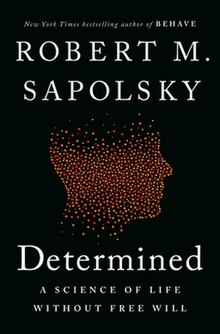Determined: A Science of Life Without Free Will
 | |
| Author | Robert Sapolsky |
|---|---|
| Language | English |
| Subject | Free will |
| Genre | Non-fiction |
| Published | 2023 |
| Publisher | Penguin Press |
| Publication place | US |
| Pages | 528 |
| ISBN | 978-0-525-56097-5 |
Determined: A Science of Life Without Free Will is a 2023 nonfiction book by American neuroendocrinology researcher Robert Sapolsky concerning the neurological evidence for or against free will. Sapolsky generally concludes that our choices are determined by our genetics, experience, and environment,[1] and that the common use of the term "free will" is erroneous. The book also examines the "ethical consequences of justice and punishment" in a model of human behavior that dispenses with free will.[2]
Reception
[edit]A review in The Los Angeles Times said of the book: "what he's written is stimulating to read, even for those who doubt his conclusions."[3] A review in Science found it to have a "dismissive attitude toward how determinism might be compatible with free will" but was "well written" and "worth reading".[1] Psychology Today's reviewer concluded it was "witty and engaging...a goldmine of fascinating information".[4] A negative review by philosopher John Martin Fischer in Notre Dame Philosophical Reviews found that "despite all the commotion over it, [the book] does not offer anything new or illuminating about free will or moral responsibility".[5] Andrew Crumey, writing in The Wall Street Journal, described Determined as "outstanding for its breadth of research, the liveliness of the writing, and the depth of humanity it conveys."[6]
A critical review by Adam Piovarchy of the Institute for Ethics and Society says that the book does not achieve what it sets out to do and that "Sapolsky’s broader mistake seems to be assuming his questions are purely scientific: answered by looking just at what the science says".[7] Philosopher Kieran Setiya in a negative review for The Atlantic criticises Sapolsky for not engaging with the philosophical literature on the question but praises his presentation of the science of decision-making.[8]
References
[edit]- ^ a b Maoz 2023.
- ^ Kirkus 2023.
- ^ Purtill 2023.
- ^ Fagan 2023.
- ^ Fischer, John Martin (2023-11-21). "Review of Determined: A Science of Life Without Free Will". Notre Dame Philosophical Reviews. ISSN 1538-1617.
- ^ Crumey, Andrew (December 2, 2023). "'Determined' and 'Free Agents' Review: No Choice in the Matter". The Wall Street Journal. Retrieved December 4, 2023.
- ^ Piovarchy, Adam (1 December 2023). "A Stanford professor says science shows free will doesn't exist. Here's why he's mistaken". The Conversation.
- ^ Setiya, Kieran (3 November 2023). "Do You Have Free Will?". The Atlantic. Archived from the original on 2023-11-16.
Sources
[edit]- Fagan, Abigail (October 17, 2023). "An Attack on Free Will – Why luck often trumps pluck". Psychology Today blog (book review). Psychology Today.
- Reese, Hope (October 18, 2023). "A Conversation With: Robert Sapolsky Doesn't Believe in Free Will. (But Feel Free to Disagree.)". The New York Times. Retrieved 19 Oct 2023.
- Maoz, Uri (12 Oct 2023), "Freedom from free will – A scientist presents a case for a predetermined future", Science (book review), 382 (6667): 163, doi:10.1126/science.adk1277, PMID 37824635
- Purtill, Corinne (October 17, 2023). "Stanford scientist, after decades of study, concludes: We don't have free will". LA Review of Books. Los Angeles Times.
- "Determined: A Science of Life Without Free Will", Kirkus Reviews (book review), August 7, 2023
Further reading
[edit]- Canfield, Kevin (October 18, 2023). "Think you have free will? Scientist begs to differ". Datebook. San Francisco Chronicle (book review).
- Revell, Timothy (18 October 2023). "Why free will doesn't exist, according to Robert Sapolsky (transcript)". CultureLab (Podcast). New Scientist.
It's hard to let go of the idea that free will exists, but neuroscientist Robert Sapolsky says that society starts to look very different once you do
